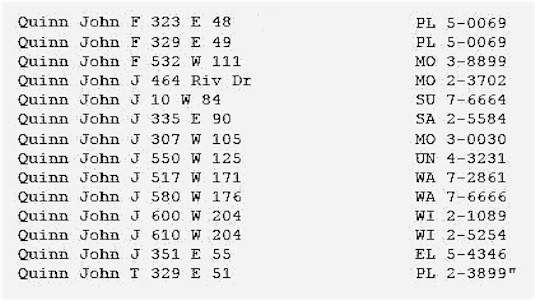Do You Remember Life Before...
...area codes and all-digit dialing?
Until the mid-1960s, the first two digits of a U.S. phone number were expressed as the first two letters of a name, such as JUpiter, MElrose, PLaza, MUrray Hill, PRimrose, etc. in order to make them easier to remember.
Area codes were devised under the North American Numbering Plan (NANP) in 1947 in order to facilitate direct long-distance dialing, and area code 201 (New Jersey) was the first one implemented in the U.S., in 1951.
Registered users can log in to post comments or submit items for the galleries.
There are 17 comments for this item.
I get more reliable service from my Verizon cell than I did with my AT&T landline. One time I had it go out for 5 days, took them forever to figure it out. Once it failed after an earthquake, but my cell still worked. And virtually every incoming call was a solicitor. The only reason I kept it was to call my cell when I couldn't find it, til I figured out that I could use Google on my desktop to make my cell ring for 5 minutes straight, even when it was on silent. And I like having an extra $40 or so every month that used to go to AT&T.
phone companies have back up power so phones still work during emergancies.
Iave an old style hard wired phone, and cordless, cordless doesn't work when power is out. I am retired from AT&T, so I get a discount, but people a landline even if is the minmum
With the advent of cell phones, isn't it time to get rid of your land line?
So, except for operated assisted calls, we could dial most places directly. But it wasn't that easy: Many of the numbers in an area code were long distance. You couldn't simply dial the number. Pacific Telephone required us to dial 112 before long distance calls. I lived in Colton, which was in area code 714. My grandparents lived in Montclair, also in the 714 area code. But it was long distance. So I had to dial 112+629-XXXX. The reason for dialing the three extra digits, was because it was long distance. Many business phones would not allow long distance calls. So the phones wouldn't allow anyone to dial more than seven numbers. (To call my music teacher in Hollywood I dialed 112+213+460-XXXX.)
Now what about when local calls crossed area code lines? No problem. Back then all locals had seven digits (or fewer). If you called from Needles and you had a girlfriend across the Colorado River in Mohave Valley, Arizona, you would simply dial 768-XXXX and she would dial you at 326-XXXX. I'm not sure if it would work if you dialed 112+602+768-XXXX. Now the Needles area code was also 714. And there was a (714) 768-XXXX. To get it you would have to dial 112+714+768-XXXX. People in Needles today probably think to dial that number as a local landline call as 1+928+768-XXXX is more complicated, dialing four more numbers.
What is complicated today in Needles is that, despite still only having one prefix and a population of only 5,000 people, when we dial any number in the city on a landline phone we must dial 1+760+326-XXXX because of the 442 area code overlay on top of the 760.
Every area code of my example phone numbers here has changed. 714 was broken off from the 213 area code about 60 years ago. It was 714. Then it was 619. Now it's 760. And maybe later we will see some action from the 442.
By the way, did you ever notice that the original area codes were assigned based on the number of phones in the area, such that the lower numbers (212: NYC, 213: LA, 312: Chicago, etc.) went to the largest cities? This was because those numbers could be dialed the quickest on a rotary-dial phone. Hawaii's area code, on the other hand, is 808.
I have a modest proposal for how to deal with the large number of devices that need phone numbers. (For instance, there are three members in my family. We have two houses and a total of 10 phone numbers; 4 voice landlines, 2 fax/DSL lines, and 4 mobile devices, counting my iPad.) I suggest that households with several phone-type devices should be assigned one main 10-digit number, and that an 11th digit could be dialed to reach the other devices, kind of like extensions. If the 11th digit was not dialed within a short time, the call would be routed to the main number by default. Anyone see any flaws in this approach? Of course, it'd mean tons of software and database fields would have to be modified to accommodate longer numbers.
Registered users can log in to post comments or submit items for the galleries.